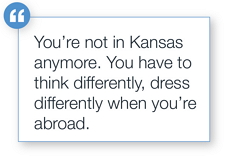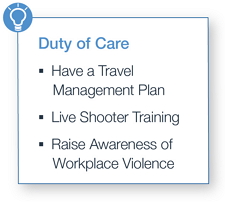Businesses have a duty of
responsibility to safeguard employees both domestically and abroad from terrorism.
Around
the world, political risk is increasing daily. There has been a geographic
shift of hot spots that weren’t previously areas of conflict. This means more people
will be impacted on a global scale – directly at the scene of an attack, and
indirectly, through city-wide lockdowns and interruptions to regular business
operations.
Such a shift in global risk is especially
worrisome for middle market businesses expanding internationally to increase
competitiveness and operational efficiencies.
 “The
business traveler from the U.S. doesn’t have the same kind of radar for
potential danger that’s naturally developed in those from other countries and
cultures,” said Hart Brown,
CORP, CBCP, LPQ, vice president, practice leader,
organizational resilience, HUB International. “They land and take the first
taxi they see and go around to see the sights. But, you’re not in Kansas
anymore. You have to think differently, and dress differently when you’re abroad.”
“The
business traveler from the U.S. doesn’t have the same kind of radar for
potential danger that’s naturally developed in those from other countries and
cultures,” said Hart Brown,
CORP, CBCP, LPQ, vice president, practice leader,
organizational resilience, HUB International. “They land and take the first
taxi they see and go around to see the sights. But, you’re not in Kansas
anymore. You have to think differently, and dress differently when you’re abroad.”
Brown says
this includes leaving a Rolex watch at home and wearing a Timex instead, as
well as staying away from any sort of political discussion with locals about
the U.S. or the host country. Interestingly, though, Brown reports that young,
single career-oriented females tend to fare better overseas than their male
counterparts as they often have more of a built-in radar. As the geopolitical climate
worldwide continues to evolve, companies will need to understand the present
risks and take appropriate precautions when sending employees overseas.
“The world
isn’t becoming kinder or gentler,” said Joseph Carrera-Casiano, senior
consultant, NYA International Limited, global risk and crisis management
consultants headquartered in London. “As a result, the duty
of care is on the part of the employer - the corporations, organizations
and agencies that employ workers sent overseas. They need to step up more than
ever to make sure their employees are properly prepared, trained and safe to go
overseas.”
An employer’s duty of care
 There are four
key focus areas companies must consider before sending their employees overseas.
There are four
key focus areas companies must consider before sending their employees overseas.
1. Have
a Travel Management Plan. C-suite executives should be
asking themselves: “What am I doing to take responsibility for the whereabouts
of my employees?” If they are going to high-risk countries, are they
receiving a security briefing before they leave? Do they know that in many
parts of the world, there is a risk involved simply in getting into a cab
and going to their hotel? Companies should impart the following five key
principles in their security awareness training:
- Have
situational awareness – Know the circumstances of your location. Understand the unique
risks there and how to stay safe.
- Don’t
have a predictable routine – When you are in one location for more
than a few days, make sure to vary your routine. Leave at a different time each
day or take a different route.
- Maintain a low profile – Don’t
call attention to yourself by wearing logoed American clothing or expensive
jewelry. Instead, before leaving, consider packing items that will help you
blend in.
- Have
a communications plan for the stay abroad – Is there a
designated person or phone number that the employee is checking in with
throughout his/her stay, each morning before heading out, and each night after
they have returned to the hotel from the day’s work?
- Incorporate different levels of security
in your day-to-day activities – When the employee checks
into their hotel, are they using the swing lock, dead bolt and a rubber door
stop? According to Carrera-Casiano, even the $1 doorstop can be the extra barrier
needed to prevent a potential attack.
2. Develop
an evacuation protocol. Discuss and develop a real
evacuation plan for employees in each location. Create criteria around the
types of activities that will warrant either them or their family members
being sent back to America. Having this discussion before they travel abroad and as new risk emerge is critical to making sure everyone knows what to do.
3. Personal
safety and security training. Carrera-Casiano considers this
more important than ever today. Knowing how to conduct yourself in the
event that you do become victim of a criminal attack, or are caught up in
a terrorist incident, is critical.
4. Raise
employee awareness when it comes to workplace violence back in the home
office.
Current events have shown us that even those businesses that don’t send
employees abroad need to actively protect them in the office. Fellow
employees are the most likely to see pre-incidence indicators. They will
know if someone has regular bursts of violence or talks aggressively. But,
according to Carrera-Casiano, co-workers often feel they can’t or shouldn’t
report this type of behavior. “In the middle market, is enough being done to
give employees a mechanism to report someone in a timely manner to prevent
workplace violence?” asks Carrera-Casiano.
Putting
the right coverage in place
As the
complexity of terrorism events increase and hot spots for risk continue to shift,
evacuation coverage is surpassing the traditionally popular
kidnapping/extortion coverage for employers who do business abroad.
Unfortunately, both are now critical to protecting workers everywhere.
Ed Rivas,
Regional Manager, Kidnap & Ransom, Financial Lines, AIG, points to the 2014
Ebola outbreak in Western Africa as a case in point. When quarantines and
barricades were employed and local military guards were stationed to keep the
peace, the situation threatened a local breakdown in civil authority.
“The outbreak could have easily
escalated to a point of uncontrollable civil unrest that would have made the
evacuation of Americans stationed there impossible. Therefore, evacuation
coverage was utilized to bring many home from Western Africa,” said Rivas.
“Companies should be planning for this. Security evacuation and pandemic
disease can now be added as a rider to the traditional kidnap, ransom and
extortion coverage.”
Contact your HUB
risk services representative to learn how your business can better protect
its employees both domestically and abroad.